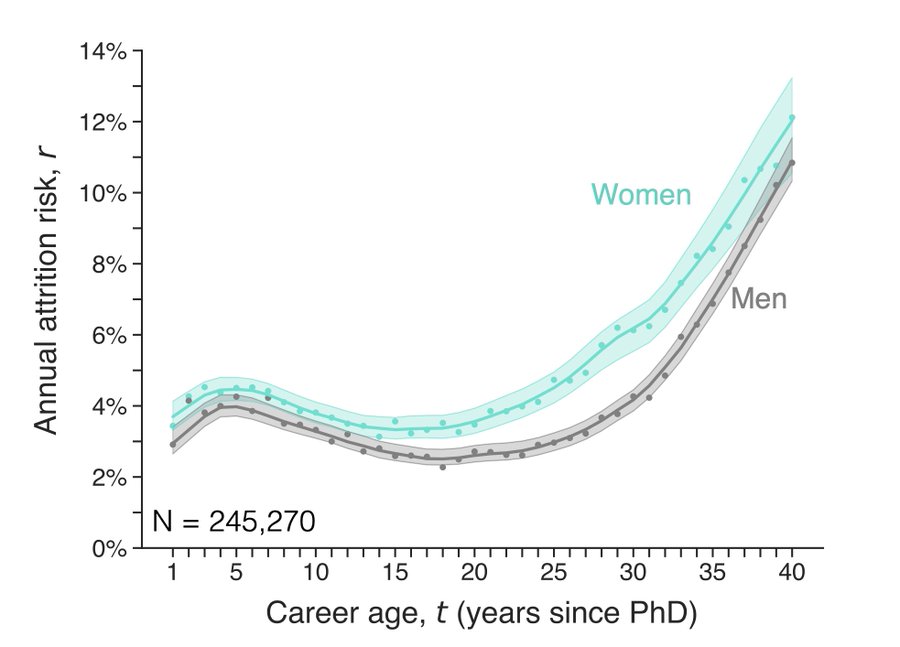Estela Rodriguez shared a post by Katie Spoon on X/Twitter:
“It’s not enough to hire more women in academia, we need to create a culture of opportunities/inclusions to make them stay.
A study published in Science Magazine finds that at ‘every career age, women are more likely to leave than men. Gender parity at hiring won’t persist’. Most likely to leave are tenured, non-STEM, faculty at lower-prestige schools.”
Quoting Katie Spoon’s post:
“ New paper! “Gender and retention patterns among U.S. faculty” with Nick LaBerge, Hunter Wapman, Sam Zhang, Allison Morgan, Mirta Galesic, Bailey Fosdick, Daniel Larremore and Aaron Clauset.
Women faculty often leave academia at higher rates than men. But most data is on:
- Early career faculty
- In STEM fields
- At elite universities.
How do the rates and the reasons for gendered attrition vary systematically over a career? Across fields? Or with prestige?
We answer such questions at scale with
- Census-level U.S. faculty employment data to estimate “all-cause” gendered attrition rates across career ages and fields
- Large-scale multi-field survey data to elucidate the gendered reasons that faculty leave.
First, at every career age, we find that women are more likely to leave than men. Gender parity at hiring won’t persist. These empirical rates imply a hypothetical 50-50 cohort would fall to 40% women over 35 years — both hiring and retention are critical for achieving parity.
Far from disappearing after tenure, gendered attrition is actually largest among tenured faculty, especially among full professors. Here, we’re showing odds ratios between women and men faculty, adjusting for career age, employer prestige, and PhD training.
But gendered attrition is not distributed uniformly, which is perhaps why smaller-scale studies can be confusing. We find larger gendered rates among: –
- Tenured faculty (especially full professors)
- Faculty in non-STEM domains
- Faculty at lower-prestige institutions
But we should not forget: attrition rates are limited – they can’t say if the reasons that women and men leave a faculty position are gendered. Women and men may leave at similar rates, but for different reasons! To know, we need to ask faculty directly why.
More than 10K faculty responded to our attrition survey, answering, Did they feel pushed out or pulled towards better opportunities and were their pushes related to work, work-life balance, or workplace climate?
First, feeling “pushed out” increased with career age for everyone. But women (STEM and non-STEM) were more likely to feel pushed out and less likely to feel pulled towards better jobs, than men, at every career age – gender was the strongest predictor of feeling pushed vs pulled.
Second, are faculty’s reasons for leaving gendered? Yes. Women former faculty most often cited climate-related reasons, while men cited professional reasons. Women and men former faculty selected work-life balance reasons equally often.
And current faculty report a very similar pattern: women cite climate reasons at much higher rates than men, and do so at all career ages. Work-life reasons are more common in the early career, and do show a gendered effect but not as large as we see for climate.
To sum up:
- Women faculty universally leave academia at higher rates than men
- Effect is stronger for tenured women in non-STEM at lower-prestige schools
- But regardless of rates, women leave for different reasons – they feel pushed out, especially by their workplace climates
Our study is limited in several ways: our data don’t span the COVID pandemic, we study only tenured and tenure-track faculty, and our data don’t support strong intersectional analyses so the results mostly reflect the experiences of white women.
Big takeaway: it’s a mistake to observe equal rates of attrition and believe gender equity has been achieved. Focus instead on the reasons for leaving, which vary by career age, field, and prestige. There’s a lot of work left to do, and climate deserves our attention.
Finally, we want to thank Academic Analytics Research Center for the employment data and all survey participants for their valuable time.”
Source: Estela Rodriguez/Twitter and Katie Spoon/Twitter
Dr. Estelamari (Estela) Rodriguez is an Associate Director of Community Outreach and Co-Lead Thoracic Site Disease Group of the Sylvester Comprehensive Cancer Center at the University of Miami Miller School of Medicine. She is a board certified in medical oncology and hematology. In the past, she was the Medical Director Thoracic Oncology at Mount Sinai Medical Center Miami Beach. Dr. Rodriguez has a special interest in the early detection of lung cancer and increasing access to clinical trials. She is a community leader and mentor to many women and minorities in medicine. Her passion is community engagement and empowering women to be advocates for their health and profession.











